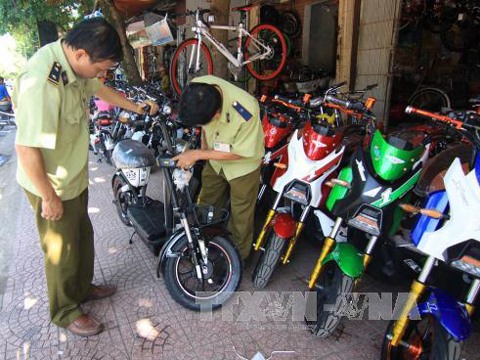 Society
Society

Motorcycles and electrical motorcycles assembled in Việt Nam or imported from other countries are infringing upon protected industrial designs. The increased production and trade of low-quality counterfeit motorbike parts, helmets, motorcycle oil and lubricants in the country is also increasingly threatening vehicle and road safety.
 |
| Officers from Hà Nội’s Market Watch Division inspect electrical motorbike stores in the city. — VNA/VNS Photo Vũ Sinh |
HÀ NỘI — Many motorcycles and electrical motorcycles assembled in Việt Nam or imported from other countries are infringing upon protected industrial designs.
The increased production and trade of low-quality counterfeit motorbike parts, helmets, motorcycle oil and lubricants in the country is also increasingly threatening vehicle and road safety.
This was confirmed at a seminar on intellectual property (IP) rights of motorcycle production and impact of IP infringement. The seminar was held on Tuesday by the Federation of Asian Motorcycles Industries and the Việt Nam Association of Motorcycles Manufacturers.
Speaking at the seminar, Nguyễn Như Quỳnh, deputy chief inspector of the IP Inspectorate under the Ministry of Science and Technology, said that at the end of last year, there were some 45 million motorcycles in Việt Nam and the IP infringement on motorcycles usually related to trademark, industrial designs, patients, trade names, unfair competition and trade secrets.
Việt Nam has used its legal framework and international commitments to ensure IP rights and take measures, including civil, administrative, criminal or border control measures, to punish violators.
For example, as part of civil measures, courts have asked violators to terminate acts of infringement, issue public apology and rectify or compensate for the act. Under administrative measures, agencies such as specialised inspectorates under the Ministry of Science and Technology, Ministry of Culture and Information, Market Watch Force, economic police and customs could deliver warnings and impose fines of a maximum of VNĐ500 million (US$22,000)
During 2012-15, nearly 26,000 cases related to the infringement of IP rights were discovered. Some 98.37 per cent of the cases were handled with administrative measures.
Under Article 171 of Việt Nam’s Penal Code, IP right violators could be given fines of up to VNĐ1 billion and three-years’ imprisonment.
Customs can impose border control measures, including suspension of customs procedures while inspecting goods suspected to be involved in IP rights infringement.
Nguyễn Trọng Tín, deputy director of the Market Management Department under the Ministry of Industry and Trade, confirmed that motorbikes, electrical bikes, their spare parts and accessories are counterfeited or smuggled into Việt Nam.
The components, raw materials and finished products are imported into Việt Nam and then processed, assembled, extracted and packed as products of well-known brands.
“The counterfeiters are doing well because certain groups of consumers are interested in cheap counterfeit goods,” he said.
Meanwhile, authentic producers did not have good awareness or co-ordination with agencies to fight these counterfeit goods, he said, adding that many businesses believed that the disclosure of counterfeit goods would affect their reputation -- consumers would refuse to buy authentic products or counterfeiters could learn more about the genuine characteristics of the products and continue to make fake goods.
Last year, the Market Management Department and its branches fined some 2,530 cases relating to IP rights and confiscated over 97,000 products.
In the first half of this year, the department cracked down on 2,721 cases with products worth some VNĐ22 billion ($968,000), including 9,730 counterfeit motorcycles and over 9,000 motorcycle accessories.
“Low-quality vehicles and motorcycle parts harm business of authentic producers and threaten road safety,” he said.
Lawyer Lê Xuân Lộc from T&G law firm said in the Vietnamese market, many electric vehicles assembled in the country or imported from other countries used infringed industrial designs that were registered for protection of major motorcycles manufacturers such as Japan’s Honda, Yamaha and Italy’s Piaggio.
Lộc said in 2015, the Piaggio Group through Vietnam Piaggio successfully sued DK Electrical Motorcycle Production Company for making electrical motorcycles similar to the Vespa. DK Company was forced to destroy more than 100 products and pay a fine of VNĐ200 million. — VNS




